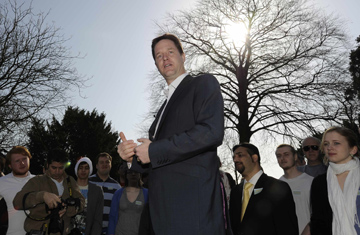
Liberal Democrats leader Nick Clegg in London, April 18, 2010
After Britain's first-ever televised debate between the leaders of the country's three main parties on April 15, one man emerged as a surprise contender to be the next incumbent at 10 Downing Street. It wasn't the Liberal Democrats' Nick Clegg, although Clegg's strong showing in last week's talkfest catapulted his party from its perennial third place to leader of the pack in a clutch of opinion polls conducted after the debate. The latest reading of public sentiment, taken by pollsters YouGov for the April 19 edition of mass-market daily newspaper the Sun, shows the Lib Dems at 33%, nudging David Cameron's Conservatives into second place with 32% and consigning Gordon Brown's governing Labour to a dismal third at 26%. But that doesn't mean Clegg — whose personal popularity ratings have soared to the postwar high enjoyed by Winston Churchill — is poised to become premier after the elections on May 6. As Churchill observed, democracy is the worst form of government except all the others that have been tried, and the British form of democracy is likely to translate the Lib Dems' new support into an increased electoral advantage for Prime Minister Brown.
A stolid communicator and a poor party manager who has only narrowly survived successive putsch attempts from within the ranks of his own colleagues, Brown entered the campaign saddled with the baggage of Labour's close to 13 years in office: the public's enduring disillusionment with Labour that is a legacy of the Iraq war, and the perception that Labour's economic policies, stewarded by Brown during his decade as Finance Minister, had fueled the boom but failed to protect against the bust. Accused by a former top civil servant of "Stalinist ruthlessness," Brown's accident-prone leadership later earned the memorable gibe from the Lib Dems' shadow finance minister Vince Cable that the Labour leader had transformed from Stalin to Mr. Bean. But Brown's rivals aren't laughing now.
The U.K.'s first-past-the-post electoral system favors parties like Labour whose voters are geographically concentrated and penalizes parties like the Lib Dems, whose voters are much more evenly distributed across the nation. The April 19 YouGov results, fed into the BBC's election-seat calculator, produce a hung Parliament, with the Conservatives winning 246 seats, Labour picking up 241 and the Lib Dems garnering just 134 despite topping the popular vote. It's a good illustration of the inequities of a system the Lib Dems have long campaigned to reform.
They're not its only potential victims. The buoyant Liberal Democrats could easily stop the Conservatives — who until the debate were the longtime favorites to win the largest slice of seats in the House of Commons — from gaining the 326 seats necessary to secure an outright majority. In a scenario that sees the Tories and Labour commanding pretty much equal blocs, the Tories fear the Lib Dems are more likely to agree to an alliance with Labour — and that would keep Brown in power. Vote anything other than Conservative and "you risk being stuck with what you have got," warned Cameron in an April 19 interview with the Guardian newspaper. Benedict Brogan, the deputy editor of the Daily Telegraph newspaper put it more pithily: "Vote Churchill; Elect Stalin."
That's funny and so is the fact that Brogan's newspaper, once widely known as the "Torygraph" because of its political sympathies, is in part responsible for the Liberal Democrats' surging popularity. Investigative journalists at the Telegraph last year exposed the misuse by MPs and peers of the British Parliament's lax expenses regimen. Anger at revelations about politicians living high on the hog as voters felt the pain of the credit crunch has left many Britons more disenchanted than ever with the political classes. The Conservatives hoped to capitalize on this by presenting themselves as the party of change.
Yet when Clegg was given a national platform by the TV debate, he successfully painted Cameron and Brown as the old choices. "The more they attack each other, the more they sound the same," he said, gesturing at his rivals and wrapping himself in a hopey-changey mantle.
Labour is openly wooing Clegg. ("I agree with Nick," a phrase Brown used seven times during the debate, already garnishes T-shirts and other merchandise.) The Tories are trying to figure out how to attack Lib Dem policies without committing the strategic blunder of being seen to attack Britain's most popular pol. For Clegg the next big test is April 22, when the party leaders again go head-to-head in the second of the TV debates, this time discussing international affairs.
That debate may scare off a few new Lib Dem supporters who find they, at least, don't agree with Nick when they realize how unambiguously pro-European he is. "I've always regarded European integration not as an inhibition of British sovereignty but an extension of it," he told TIME last month. But Clegg is also likely to get a boost from reminding Britons that his was the only party to oppose the invasion of Iraq. If the man dubbed Mr. Popularity by the British media maintains his momentum, Britain is set for that most oxymoronic of events: an exciting election.
